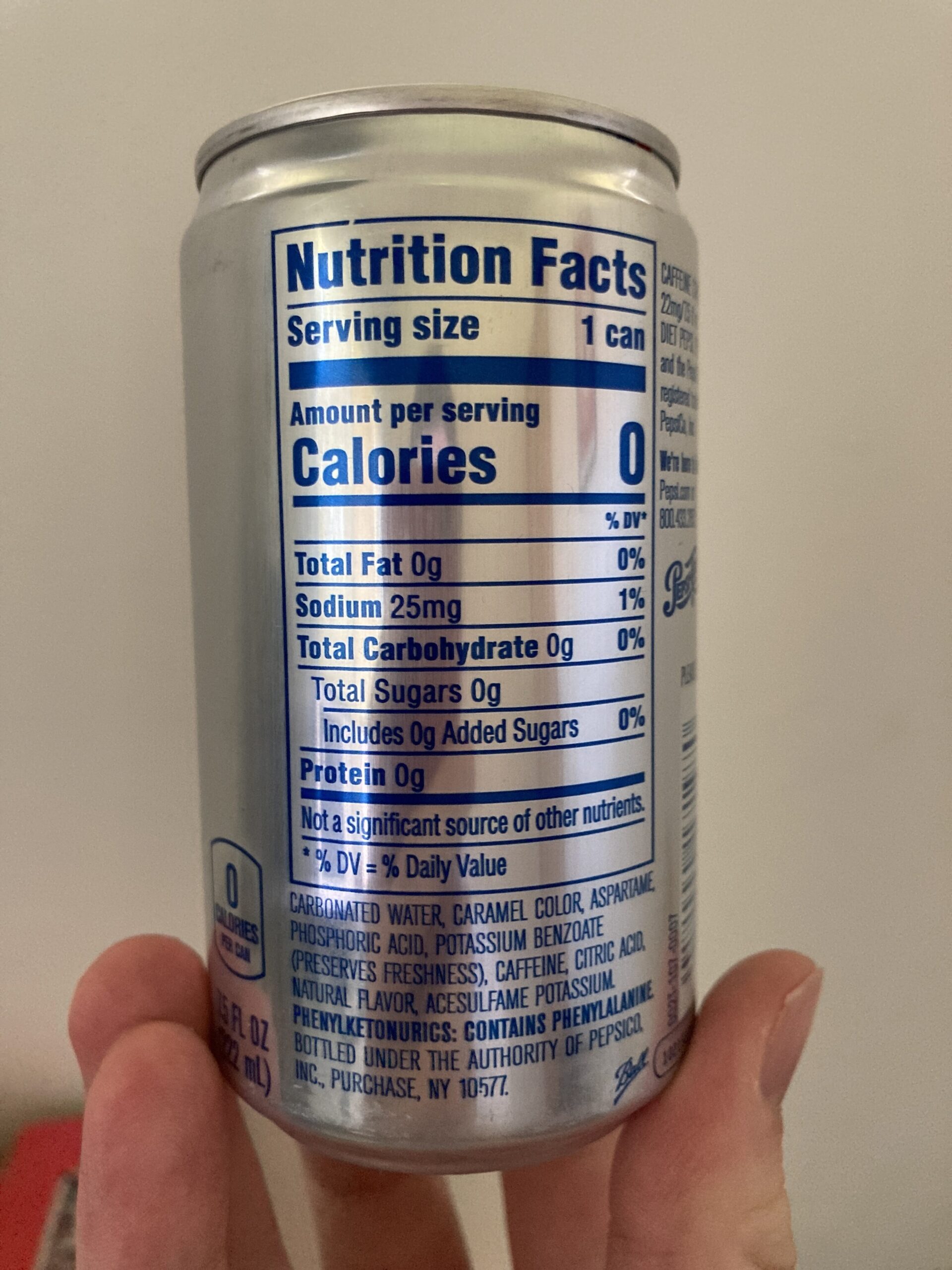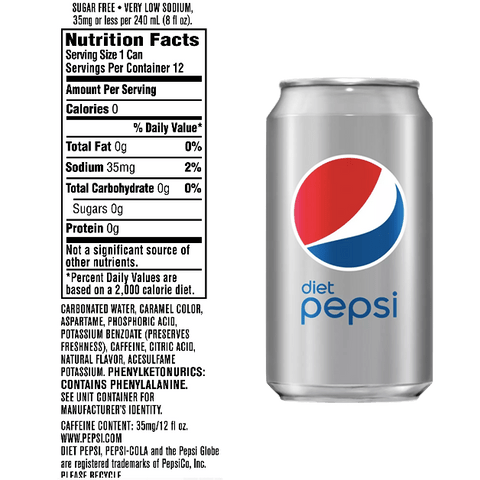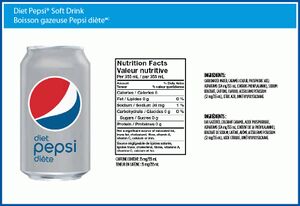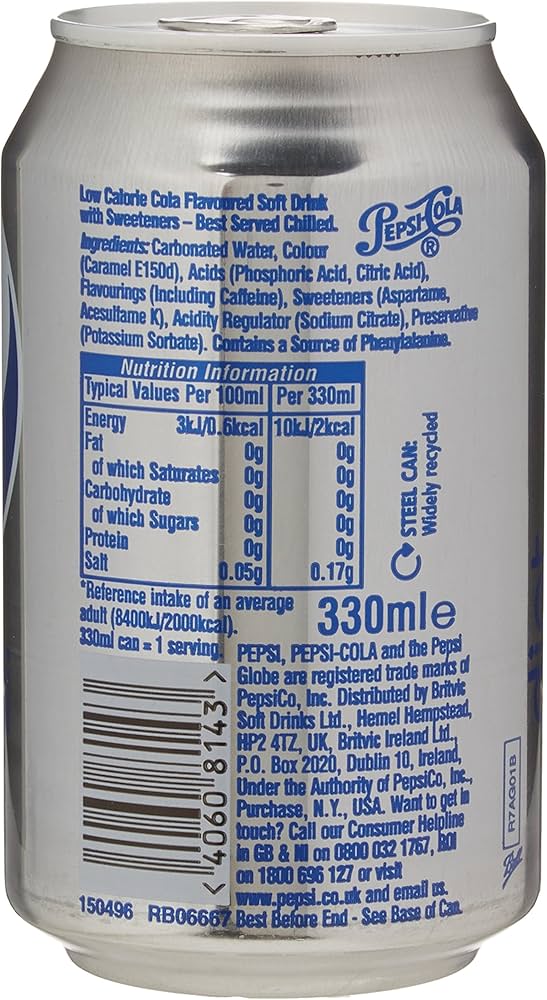What do you really know about the beverages you enjoy? Particularly when it comes to something like Diet Pepsi, there are often mixed feelings and uncertainties about what you’re drinking. Are you making a healthy choice, or are there hidden downsides you should consider? Let’s get into the details, breaking down the Nutrition Facts Of Diet Pepsi and what they mean for you.
The Appeal of Diet Soda
Diet Pepsi has become a staple for many looking to enjoy the classic taste of cola without the calories and sugar associated with regular soda. This appeal can be quite tempting; after all, who wouldn’t want to indulge without the guilt? But before you grab that can, it’s essential to understand what’s behind the label.
While the absence of sugar may seem like a win, there are other ingredients that you should be aware of, particularly artificial sweeteners. Understanding how these alternatives work—or don’t work—for your body is critical in making informed decisions.
The Basic Nutrition Facts
Before we dive into the details, here’s a quick look at the typical nutritional profile of Diet Pepsi:
| Nutrient | Amount per 12 fl oz (355 mL) |
|---|---|
| Calories | 0 |
| Total Fat | 0 g |
| Sodium | 40 mg |
| Total Carbohydrates | 0 g |
| Sugars | 0 g |
| Protein | 0 g |
| Caffeine | 38 mg |
Zero Calories: The Big Draw
You might be relieved to see that the calorie count is a flat zero. For those watching their weight or managing caloric intake, this can be quite a relief. However, it’s important to understand that zero calories don’t necessarily mean zero consequences.
No Sugar, No Problem?
Unlike regular Pepsi, Diet Pepsi replaces sugar with artificial sweeteners, specifically aspartame and/or acesulfame potassium. This switch alters the way your body interacts with the drink. While you can enjoy the sweetness without the calories, studies suggest that artificial sweeteners could potentially affect your metabolism in ways that are still being uncovered.

This image is property of images.openfoodfacts.org.
The Use of Artificial Sweeteners
Aspartame: The Controversy
Aspartame is perhaps one of the most talked-about ingredients in many low-calorie drinks. While it’s considered safe by numerous health organizations, there are ongoing discussions about its long-term effects. Some people have reported unpleasant side effects, including headaches or digestive issues. If you’re sensitive to aspartame, you might want to consider this before making Diet Pepsi a cornerstone of your beverage choices.
Acesulfame Potassium: What You Should Know
Acesulfame potassium (often called Ace-K) is another sweetener used in Diet Pepsi. It’s often combined with other sweeteners to enhance flavor. Just like aspartame, it’s generally recognized as safe, but some data suggests it may affect blood sugar levels or gut health in ways we still don’t fully understand.
Understanding the Sodium Content
While you may think about sugar and calories when selecting a drink, keep an eye on the sodium levels, too. A typical can of Diet Pepsi contains around 40 mg of sodium. For those on a strictly regulated sodium intake, that might be something to factor into your overall diet.
Sodium’s Role in Your Health
Sodium is essential for various bodily functions, but too much can lead to high blood pressure and other health issues. This means that if you’re drinking multiple sodas a day, you should consider how that sodium accumulation fits into your daily diet.

This image is property of waterbutlers.com.
Caffeine: A Common Choice
Many people enjoy Diet Pepsi for its caffeine content. With around 38 mg per 12 fl oz can, it offers a mild boost without overdoing it. If you’re trying to reduce caffeine in your diet, keep in mind that this beverage can still contribute to your total daily intake.
Caffeine Sensitivity
If you’re sensitive to caffeine, even a drink like Diet Pepsi could trigger symptoms such as jitters or insomnia. Always listen to your body and how it responds to caffeine, even in moderation.
The Importance of Hydration
While Diet Pepsi can certainly quench your thirst, it’s vital to remember that it shouldn’t replace water as your primary source of hydration. Artificial sweeteners and caffeine can have diuretic effects, leading to increased urination. Staying hydrated with water will always be your best bet.

This image is property of wiki.ubc.ca.
The Bigger Picture: Lifestyle Choices
What you drink is just one part of a bigger picture related to your overall health. Making informed dietary choices often involves considering not just calories but also the nutritional profile of what you consume every day. It’s crucial to approach your drink choices, including Diet Pepsi, with a balanced mindset.
Moderation is Key
While an occasional Diet Pepsi isn’t likely to cause harm, a diet excessively high in dietary sodas might lead to unintended consequences. Research continues to explore the long-term effects of consuming artificial sweeteners and other additives prevalent in diet sodas. Moderation is crucial, as is the inclusion of a variety of beverages.
Alternative Options
If you’re seeking a refreshing beverage without the potential drawbacks of Diet Pepsi, consider opting for alternatives. Here are a few choices that are friendly to your health while still providing a delicious taste:
Sparkling Water: Naturally Refreshing
Sparkling water or seltzer can give you that bubbly sensation without sugars or artificial ingredients. You can even add a slice of lemon or lime to enhance the flavor without adding calories.
Herbal Teas: A Warm Alternative
If you’re in the mood for something warm, herbal teas are loaded with antioxidants, and you can enjoy them iced or hot. With a variety of flavors available, they can satisfy any craving without compromising your health.
Juice: Fresh and Flavorful
When looking for something with more natural ingredients, freshly squeezed juices can be a great option. Just be cautious of serving sizes, as even natural juices can be high in sugars.

This image is property of Amazon.com.
Final Thoughts on Diet Pepsi and Your Choices
When you enjoy Diet Pepsi or any other diet soda, it’s essential to remain informed about what you’re consuming. While the calorie-free allure may be tempting, the potential impacts of artificial sweeteners and other components warrant thought beyond just the immediate satisfaction.
Stay mindful of your overall diet and activity level, listening to how your body reacts to different drinks. Understanding what goes into these options can empower you to make healthier choices that support your individual wellness goals.
As with many aspects of nutrition, it comes down to finding balance. Whether you choose to enjoy that Diet Pepsi or opt for another refreshing beverage, you’re the one in control of what goes into your body. Enjoy your drinks, but also stay curious about the ingredients and effects of what you’re consuming—after all, knowledge is a form of nourishment, too.